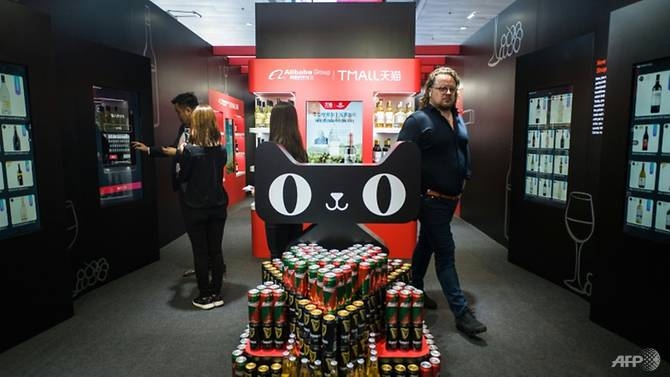Alibaba shows off automated wine store in Hong Kong
 |
| Customers browsed a pop-up shop stacked with wine bottles, billed by Alibaba as a way to show off its latest smart tech to retailers, at the annual Vinexpo fair in Hong Kong. (Photo: AFP/Anthony WALLACE) |
Billed by the company as a way to show off its latest smart tech to retailers, customers browsed a pop-up shop stacked with bottles, set up inside the city's convention centre for the annual wine show.
All bottles are embedded with a tracking tag, so as soon as a customer picks it up, information about it shows on a nearby screen.
Facial recognition allows customers into an adjoining payment room where sensors recognise which bottles they are carrying.
Once they have confirmed the purchase a charge is made to their Alipay account - the online and mobile payment platform is widely used across China.
Responses to the wine store were mixed.
"It's really good to bring out all the information on the screen, the producer, the region, the price and then make the decision whether you want to buy or not," said Erica Babbage, marketing manager at an Australian wine company.
"Face recognition is very good. It's so convenient," she added.
But others were sceptical.
"One thing you should be careful about is data protection. I don't know how they are going to manage that," said a French visitor who gave his name as Siret.
"If you put that shop from where I come from in Europe, it would never work."
Shanghai-based BingoBox launched an automated 24-hour convenience store last year, while US online giant Amazon unveiled its first cashier-free shop in Seattle in January.
Alibaba opened cashierless store "Futuremart" at its Hangzhou headquarters in April, and also launched staffless pop-up Tao Cafe there last year.
The firm has invested heavily in recent years to connect its online and offline businesses.
What the stars mean:
★ Poor ★ ★ Promising ★★★ Good ★★★★ Very good ★★★★★ Exceptional
 Tag:
Tag:
Related Contents
Latest News
More News
- State corporations poised to drive 2026 growth (February 03, 2026 | 13:58)
- Why high-tech talent will define Vietnam’s growth (February 02, 2026 | 10:47)
- FMCG resilience amid varying storms (February 02, 2026 | 10:00)
- Customs reforms strengthen business confidence, support trade growth (February 01, 2026 | 08:20)
- Vietnam and US to launch sixth trade negotiation round (January 30, 2026 | 15:19)
- Digital publishing emerges as key growth driver in Vietnam (January 30, 2026 | 10:59)
- EVN signs key contract for Tri An hydropower expansion (January 30, 2026 | 10:57)
- Vietnam to lead trade growth in ASEAN (January 29, 2026 | 15:08)
- Carlsberg Vietnam delivers Lunar New Year support in central region (January 28, 2026 | 17:19)
- TikTok penalised $35,000 in Vietnam for consumer protection violations (January 28, 2026 | 17:15)






















 Mobile Version
Mobile Version